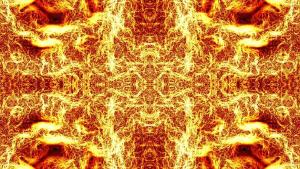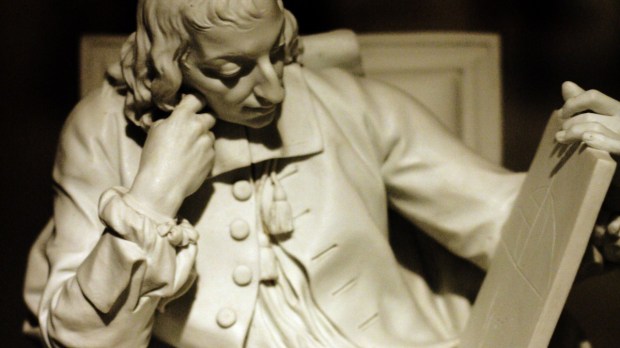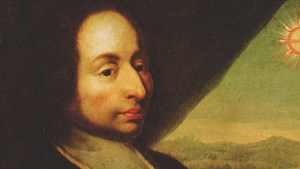In 2017, Pope Francis declared in an interview with the Italian press that he personally thought that Blaise Pascal could be beatified. I.MEDIA interviewed Geoffroy Aujay de la Dure, vice-president of the Society of Friends of Blaise Pascal. He founded the society with friends from university in 2019 with the aim of promoting Pascal’s cause of beatification. He is delighted with the publication of the Apostolic Letter Sublimitas et miseria hominis on the French philosopher, which confirms them in their “desire to see Pascal elevated to the altars.”
This June 19, to mark the fourth centenary of Blaise Pascal’s birth, Pope Francis has published an Apostolic Letter on the French philosopher and scientist. How do you react to this announcement?
de la Dure: There’s a certain pleasure, undeniably, in knowing that Pascal is so highly esteemed in the mind of a Jesuit. All the more so given that he is a Jesuit whom Providence has placed on the Throne of Peter. We should recall that the Society of Jesus suffered from the publication of Les Provinciales, and that the order’s expulsion from France, albeit a hundred years after the writing of the Petites Lettres (as they were also called), was not uninfluenced by the admonitions Pascal made in them.
It therefore seems to us that the Holy Father is doing a work worthy of him, and worthy of a pope, in bringing to light Pascal’s spirituality and his treasure for the good of the Church, despite associations with the history that might have held him back. This letter will break the padlock that prevents Christians from profiting from it in all purity and security of conscience, and heralds a movement in the people of God as extraordinary as it is profound.
Was Pascal a saint?
In 2017, Pope Francis said he personally thought that Pascal should be beatified. Do you see this letter as a further step towards sainthood?
de la Dure: With this letter, the Pope, on his own authority, chooses to publicly confess his admiration for the man and his work. We, for our part, find nothing more engaging than this feeling which is born of a long-standing and ongoing relationship with Pascal. This letter, then, whets our appetite — if possible — to see Pascal elevated to the altars. It encourages us to believe that the time is near when we will be able to pray on two knees to the author of the Pensées. Moreover, it comes in a way that seems providential to us. The needs of the times seem to urge us constantly to have recourse to the intercession of this Christian who made so many Christians.
One of the Pope’s teachers, the theologian Romano Guardini, states that Pascal “was certainly not a saint.” He suggests instead that he should instead be described as a “great Christian.” Do you think this distinction is relevant?
de la Dure: I don’t know where this “certainly” comes from. The greatness of Pascal’s virtues, of which we have many testimonies, leads to a quite opposite conviction. Pascal fiercely fought pride, curiosity, and sensuality. He had only Jesus Christ in view.
What’s more, there are signs that he was considered a saint when he died. Letters from his correspondence were cut up to make relics. A great aristocrat and friend, the Duke of Roannez, founded a small group called the “pascalins” who wanted to live according to Pascal’s spirit.
There are also eloquent testimonies from abroad. In a 1748 work titled An enquiry concerning Human Understanding, the Scottish author David Hume — hardly suspected of being biased in his favor — refers to “the famous Pascal, whose sanctity of life, as well as extraordinary capacity, is well known.”
Finally, one would have to blindfold oneself not to notice the innumerable conversions that arose from reading Pascal. Claudel, who did not have the fondest of feelings for the writer of the Pensées, could not help but consider him “the apostle ad exteros” (the apostle to those outside,Ed.)
Pascal and intellectuals
Your association is supported by academics. Is Pascal a saint for intellectuals?
de la Dure: Yes, Pascal could be a patron saint for intellectuals, insofar as he is an invaluable aid in preventing reason from going astray — either because it stoops too low, despairing of ever knowing the truth, or because it rises too high and believes it can know everything, refusing to make room for faith. I think Pascal would enable intellectuals to have a fair relationship with the capacities of their reason.
Secondly, Pascal was always very practical. He never locked himself away in the clouds of ideas and theorems, but always turned his mind to practical inventions. He invented the calculating machine, which we use every day, and which he developed to help his father count taxes. Why not make him the patron saint of engineers? But perhaps that place is already taken!
Pascal’s spirituality
You pointed out the irony of Francis, the first Jesuit pope, choosing to pay homage to Pascal, a fierce opponent of the Society of Jesus in his day. What do you think Francis likes about Pascal?
de la Dure: If there’s one feature of Pascal’s spirituality that appeals to the Pope above all others, it would be, in my opinion, the affirmation of the necessity of grace and the rejection of all Pelagianism. The Pope has never ceased to remind us that man cannot attain salvation by his own efforts.
Can we separate the combative Pascal of Les Provinciales from the contemplative, spiritual, and mystical Pascal who seems to win over the Pontiff?
de la Dure: It’s impossible to separate the combative Pascal from the contemplative Pascal. The Pensées were written at the same time as Les Provinciales. These two aspects of Pascal’s life are indissolubly linked, and we believe that they must be so in every Christian, insofar as love of the truth obliges us to speak out publicly for it. Of course, it’s not a question of making it triumph, for that belongs to God, but of committing oneself with all one’s being to defending it in season and out of season, whenever it is threatened.



